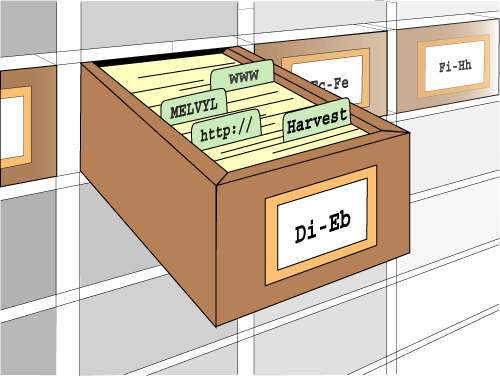| |
Beyond the Card Catalog:
Library Research Tools Continue to Expand By Gail Yokote, Assistant Librarian for Research Services and Collections
There were few options available to individuals who wanted to search the Melvyl system databases and to use library services without coming into the library in the early 1990's. In those days, a person had to use telnet software to access the Melvyl databases from campus offices, labs, and homes. If they wished to renew library books they had to pick up a phone or visit the circulation desk to do so. Library staff themselves were using technologies, such as gopher and archie for Internet-accessible resources and the web browser, Mosaic, was introduced in 1993. Today, there is a richer variety of electronic and resources to support research and educational interests. In fact, the library has converted many print docs to digital formats. (see sidebar for more info).The card catalogs of today are online databases that allow library users to search from their home computers. Recently, the library has been adding to its cache of online resources. While the Melvyl Catalog and Periodicals databases may still be searched to identify what materials are available in any of the UC libraries, there is now a new online catalog for access to the UC Davis Library's collections. The Harvest Library Catalog (http://www.lib.ucdavis.edu/HARVESTCATALOG) is a local database of records describing the print and electronic books, journals, and media housed in our libraries or licensed for access by UC Davis faculty, staff, and students. It features information showing the latest journal issue received, titles of books, journals, and other media that have been ordered, but not yet received, plus virtual library shelf browsing using call numbers. Soon, the Melvyl Catalog and Periodicals databases will be merged into one Melvyl database that will offer similar search features to the Harvest Library Catalog.
Another new library tool for UC Davis faculty, staff, and students is the Harvest Library Portal (http://www.lib.ucdavis.edu/HARVESTPORTAL). The portal features broadcast searching among several databases simultaneously and MyUCDavis-like functions, such as one's own private electronic bookshelf and space for customized saved searches to be run against one's pre-defined list of databases. Initially, the Harvest Portal was implemented to allow simultaneous searching of both the Harvest Library Catalog and the Melvyl Catalog and Periodicals databases by entering search terms only once and retrieving results from all of these databases in a unified presentation. In the future, more databases and other electronic resources will be added as well as new features that will help individuals navigate the wealth of resources that the library has. All of these library resources can be reached by pointing one's web browser to http://www.lib.ucdavis.edu. UC Davis individuals who are using a commercial Internet service provider or DSL to access the library's resources can find instructions at http://www.lib.ucdavis.edu/info/computers/remote.html. (The instructions are imperative since the site is restricted to UC Davis affiliates only. There are legal and contractual requirements the Library needs to meet with its information providers.) For more information and assistance in using the wealth of library resources and services contact your librarian subject specialists (http://www.lib.ucdavis.edu/resources/colldevel.html). |


